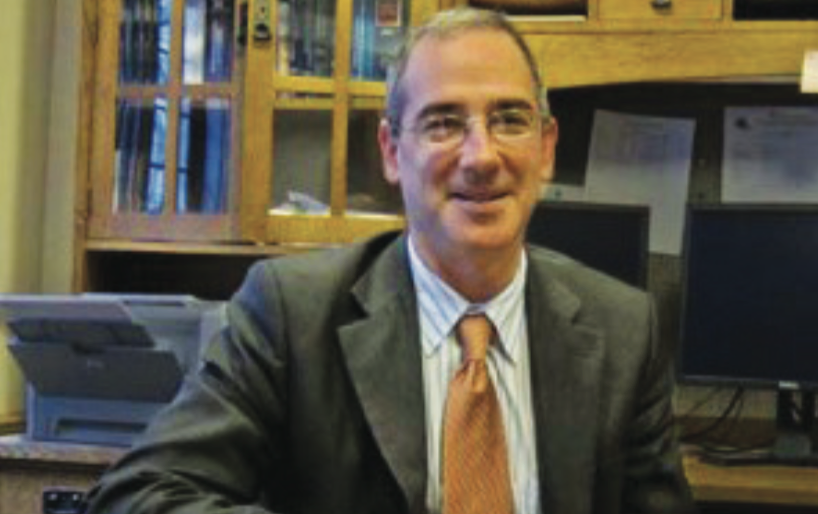Students and faculty crowed into Elman Auditorium last Wednesday to attend a seminar by Yale Law School Professor and Choate parent Michael J. Wishnie P ’16. The talk highlighted President Trump’s P ’00 Executive Orders and their impact on immigration in the United States. Afterwards, attendees asked questions about the topic. In addition to being a Yale professor, Mr. Michael J. Wishnie is the Deputy Dean of Experiential Education, the William O. Douglas Clinical Professor of Law, and Director of the Jerome N. Frank Legal Services Organization at Yale Law School. His focuses include immigration, labor and employment, habeas corpus, civil rights, government transparency, and veterans’ law.
Mr. Wishnie first addressed the recent Executive Orders of the Trump administration, specifically the three that relate most to immigration conflicts. The first included building a wall along the United States-Mexico border and increasing the amount of border control agents. The second Order, Mr. Wishnie described, encompassed more of an interior enforcement. He elaborated upon the consequences the order pushed upon sanctuary cities that suspended federal funding as well as increased federal immigration enforcement. The third Order, and perhaps the most relevant, was the order entitled, “Protecting the Nation from Foreign Terrorist Entries,” signed into action on January 27.
He also spoke of his involvement with the executive orders and how he and his students have worked to stop injustice and discrimination against refugees. After being alerted of an Iraqi refugee trapped at the JFK airport, Mr. Wishnie rallied his students into filing a lawsuit in the refugees’ defense. However, they soon realized that hundreds of others across the country were in the same situation. Soon enough, the students and Mr. Wishnie filed a lawsuit with a request for class certification. After the case was heard, the judge signed a nationwide order saying that refugees trapped at airports because of the executive order cannot be sent back to their respective countries.
“Law alone is far from enough,” explained Mr. Wishnie. “It is only because of the mobilization of thousands of people that went to airports that really initiated the change.” The Executive Order has since been acted upon by five or six other cases, most of which disqualify the majority of the Executive Order and rule the ban unconstitutional. While the executive orders under the Trump administration have been high in numbers, the “Muslim ban” initiative has proved to be the most controversial and has had the most significant effect.
In a response to a question about the title, “Muslim Ban,” Mr. Wishnie explained that he believed that the order is an effort to target Muslims, despite the government’s denial. “If action is directed at a particular group, it is still illegal, even in immigration,” he added.
Mr. Wishnie also responded to questions about the executive order’s impact on the United States’ judicial branch. He elaborated upon how President Trump has undermined the respect of the judges, as well as the power of Supreme Court Justice Kennedy. Mr. Wishnie explained the need for people to speak up against the Orders to prevent a Supreme Court ruling in favor of President Trump. “Courts are not insensitive to the popular opinions of the nation, and they tend to follow the way of the people,” stated Mr. Wishnie. In addition to the judicial branch, Mr. Wishnie also highlighted the role of Congress in the Executive Orders and varying opinions within the Republican party. Without approval from Congress, President Trump cannot add criteria for sanctuary cities; nevertheless, more and more Connecticut cities are pushing to separate their local police from federal immigration groups.
In an effort to help students with educational visas who are from countries mentioned in the Executive Order better understand the issue, Mr. Wishnie said, “Future executive orders may try to deport people whose visas are revoked or expire. It will affect hundreds of thousands of people.” Despite the impact that groups are making in response to the executive orders, Mr. Wishnie emphasized that he did not recommend travel for students with visas from these countries.
However, Mr. Wishnie did encourage the involvement of students. In his speech, he pushed for the unification and connection with each other under a common goal. Mr. Wishnie explained that he did not underestimate the power of young students, and he believed in the efforts of people nationwide. Said Mr. Wishnie, “When we all stand up and contribute what we can, resistance can be effective.”





